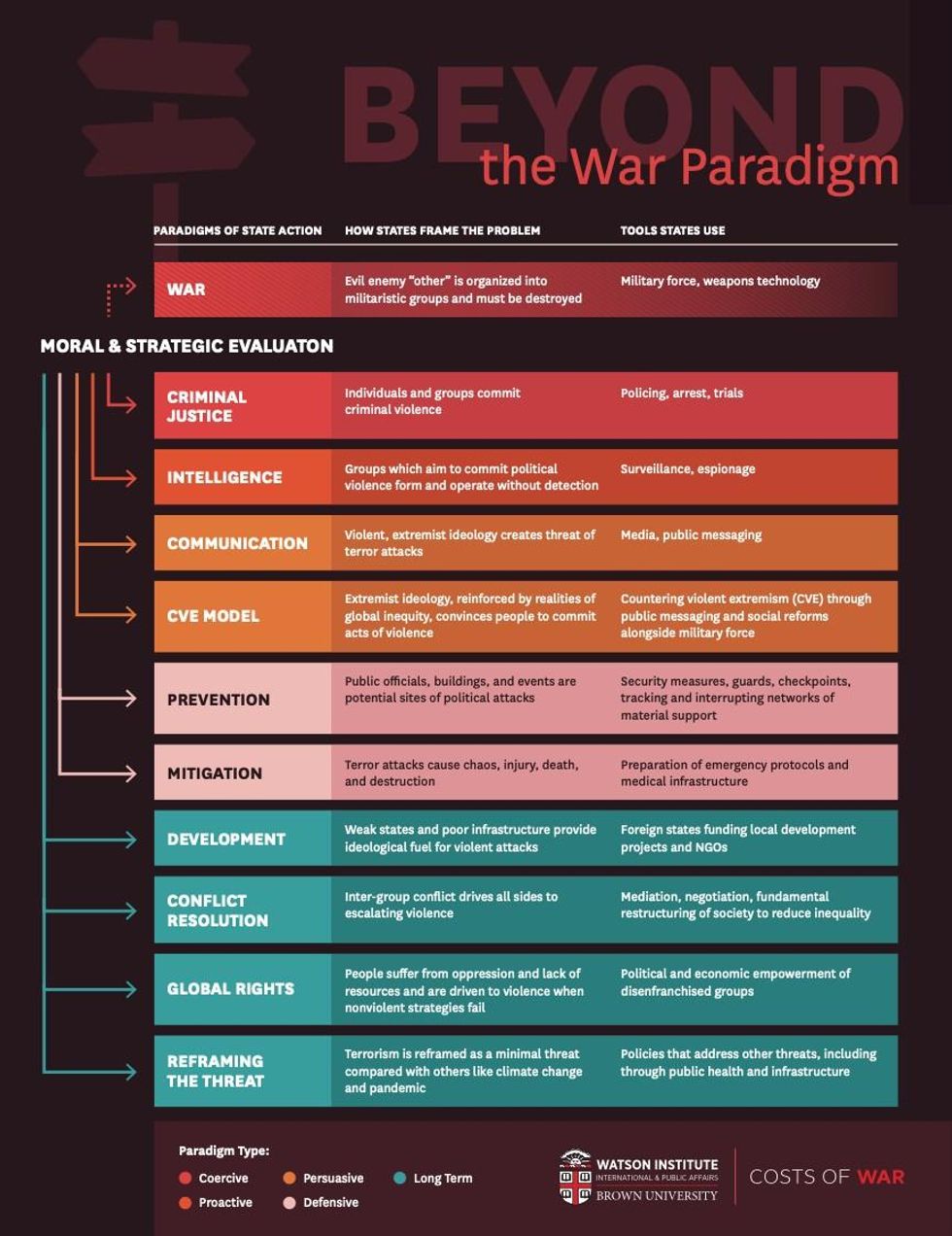After more than two decades of the widely condemned "global war on terror" launched by the United States government in the wake of the 9/11 attacks, a report released Tuesday offers 10 alternatives to the nation's militarized approach to national security.
"A reevaluation of the U.S. approach to counterterrorism is a moral and strategic imperative."
The new paper--entitled Beyond the War Paradigm: What History Tells Us About How Terror Campaigns End--was authored by Jennifer Walkup Jayes for the Costs of War Project at Brown University's Watson Institute for International and Public Affairs.
"Since 9/11, U.S. media, politicians, and security experts have produced a deluge of pro-war content, establishing and further normalizing a paradigm that treats war-making as the natural response to terror attacks," says the report's introduction.
"At the same time, research has shown that government violence against people in the name of counterterrorism, wartime destruction of infrastructure, and long-term U.S. military presence abroad breed ill-will toward the U.S. and broaden support for the same groups that the U.S. post-9/11 wars officially aim to eliminate," the introduction continues. "Given these circumstances and other human, social, and economic costs of waging war, a reevaluation of the U.S. approach to counterterrorism is a moral and strategic imperative."
The report features an infographic that details the 11 state-led models--including the war paradigm--as well as how countries frame the problem and tools they use:
The paper, which sorts the approaches into five categories, notes that "in practice, real-world counterterrorism programs leverage a variety of these models, often simultaneously."
In The Intercept's exclusive coverage of the report, journalist Nick Turse pointed out that neither Iraq nor Afghanistan "is a democracy or economically viable" after 20 years of U.S. war and occupation, and the latter "now teeters on the brink of economic collapse and is ruled by the very regime that Bush deposed in 2001."
According to Turse:
Experts say this cascade of failures could have been largely avoided. "You can envision a scenario, after 9/11, in which the terrorist attacks were treated primarily as a criminal justice problem," said Stephanie Savell, co-director of the Costs of War Project, noting that the FBI and the CIA could have led the effort with a goal of arresting, prosecuting, and imprisoning Osama bin Laden and others who planned the attacks.
While noting that the Costs of War report highlights drawbacks to this approach, Savell told The Intercept that it would have been transformational. "You wouldn't have seen 20 years of conflict and this incredible waste of resources," she said. "The U.S. response wouldn't have led to this spiral of escalation, of war and violence begetting more war and violence."
Along with examining historical and theoretical "nonmilitary models of counterterrorism," the paper advocates for "reframing predominant understandings of global security around far more significant threats."
While 3,455 U.S. citizens were killed in terror attacks from 1995 to 2019, according to the National Consortium for the Study of Terrorism and Responses to Terrorism (START), Costs of War data shows post-9/11 U.S. wars have directly killed over 929,000 people globally.
"The reality is that poverty, racism, and other structural inequalities pose far greater threats to human lives than do terror attacks," the paper states, pointing to the death tolls from lack of health insurance in the United States and climate crisis-related extreme weather events.
"These threats are far more dangerous to far more people than are violent groups who use terror tactics, and there are feasible policies to address them," the report asserts. "This speaks to the political imperative to reframe common U.S. understandings of security to include a fuller recognition of what human security truly entails."
As Savell told Turse: "If the U.S. government had used even a portion of the $8 trillion spent and obligated on the post-9/11 wars on other domestic policies to promote societal health and well-being or mitigate the effects of climate change, that would have resulted in far more meaningful human security in this country."
Turse reported that though the Biden administration is supposedly working on a new "playbook" for counterterrorism operations, the White House decline to provide an update on the status of that review or disclose when new polices may be announced or implemented.
A senior White House official simply told The Intercept that "we continuously assess our counterterrorism posture around the world and make adjustments as needed."
Earlier this month, U.S. special forces conducted a raid in Syria that ended with the death of the leader of the Islamic State (ISIS) but also several children. That followed a U.S. airstrike in Afghanistan last August that killed 10 civilians, including multiple children.
Acknowledging the August attack, Hina Shamsi, director of the ACLU's National Security Project, said last month that "what's needed is a truly systemic overhaul of our country's civilian harm policies to address the massive structural flaws, likely violations of international law, and probable war crimes that have occurred in the last 20 years."
Also in January, Reps. Pramila Jayapal (D-Wash.) and Barbara Lee (D-Calif.) unveiled a resolution that calls for, as they summarized it, "United States foreign policy to better focus on diplomacy, nonmilitary tools, conflict resolution, global cooperation, and accountability instead of a constant over-reliance on military force and bloated Pentagon spending."




